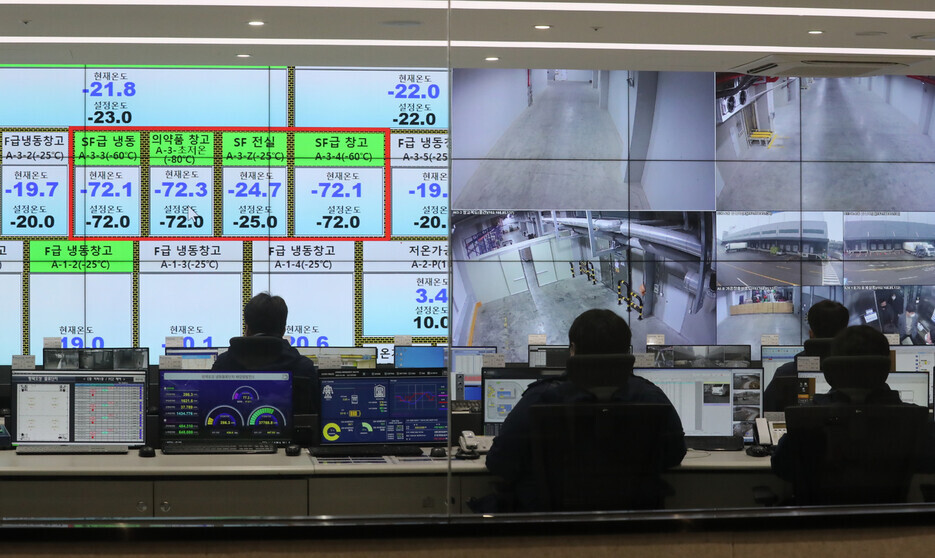hankyoreh
Links to other country sites 다른 나라 사이트 링크
S. Korea to begin vaccination of 50,000 healthcare workers starting February

The South Korean government has announced plans to provide COVID-19 vaccinations to the entire population beginning in February.
The government will begin by inoculating 50,000 healthcare professionals who are treating COVID-19 patients. The objective is to vaccinate 70% of the population and achieve herd immunity by November.
According to the government’s vaccination program announced on Jan. 28, inoculations will begin in February with 50,000 doctors and nurses at dedicated COVID-19 hospitals, along with 780,000 residents and staff at nursing hospitals and nursing homes.
Beginning in mid-March, vaccinations will be provided to an additional 440,000 people, including health workers at facilities for patients with severe symptoms, such as tertiary hospitals, general hospitals and clinics. The category also includes first response workers, epidemiologists, and disease control staff. People involved in testing and transportation will also be vaccinated.
“Vaccinations are expected to begin sometime around the last week of February, when supplies of AstraZeneca vaccines are scheduled to arrive,” said Korea Disease Control and Prevention Agency (KDCA) Commissioner Jung Eun-kyeong. The first person to receive a vaccination has yet to be decided.
During the second quarter, vaccinations will begin in May for people aged 65 and over and for residents and staff at facilities considered vulnerable to COVID-19, including seniors, disabled people and the homeless. A total of 8.5 million people will be eligible for vaccination in the second quarter, including 380,000 health workers at hospitals, pharmacies and other establishments not considered high-risk.
During the third quarter, vaccinations will begin for people aged 50 to 64; those with chronic conditions; soldiers, police, firefighters and workers in essential infrastructure; childcare workers; and people aged 18 to 49. While there are no plans to administer vaccines to young children, adolescents and pregnant women for the time being, that may change according to clinical findings.
The decision on the vaccination timeline will be based on factors such as the risk of serious symptoms, preservation of the national healthcare and disease control system, and transmission rates, the government explained.
The government plans to administer the Pfizer and Moderna vaccines at 250 inoculation centers nationwide, while the AstraZeneca and Janssen vaccines will be provided through around 10,000 designated healthcare institutions. A “vaccination service on wheels” will be provided as of February for 780,000 residents and staff at nursing hospitals, nursing homes, psychiatric wards and rehabilitation facilities. Vaccination of 390,000 residents and staff at residential facilities for severely disabled persons will begin in May.
Long-term international residents with registration cards will receive vaccinations according to the same timeline as South Korean nationals. Jung explained that unregistered international residents “will be vaccinated when needed.”
People who have to urgently leave the country due to official business will be eligible for priority vaccination as of the second quarter. They will be subject to stringent documentation by the presiding agency.
Experts said the government should begin right away with developing a more detailed implementation plan.
“Stating the principles of priority [vaccination] is a different thing from actually putting them in to practice on the ground,” said Kim Chang-yup, a professor of public health sciences at Seoul National University.
“We need a more concrete implementation plan so that the actual vaccination process doesn’t result in exclusion or inequity for minorities and vulnerable populations, who are usually more difficult to track and manage in administrative terms,” he said.
By Kim Ji-hoon, staff reporter
Please direct comments or questions to [english@hani.co.kr]

Editorial・opinion
![[Column] Season 2 of special prosecutor probe may be coming to Korea soon [Column] Season 2 of special prosecutor probe may be coming to Korea soon](https://flexible.img.hani.co.kr/flexible/normal/500/300/imgdb/original/2024/0426/3317141030699447.jpg) [Column] Season 2 of special prosecutor probe may be coming to Korea soon
[Column] Season 2 of special prosecutor probe may be coming to Korea soon![[Column] Park Geun-hye déjà vu in Yoon Suk-yeol [Column] Park Geun-hye déjà vu in Yoon Suk-yeol](https://flexible.img.hani.co.kr/flexible/normal/500/300/imgdb/original/2024/0424/651713945113788.jpg) [Column] Park Geun-hye déjà vu in Yoon Suk-yeol
[Column] Park Geun-hye déjà vu in Yoon Suk-yeol- [Editorial] New weight of N. Korea’s nuclear threats makes dialogue all the more urgent
- [Guest essay] The real reason Korea’s new right wants to dub Rhee a founding father
- [Column] ‘Choson’: Is it time we start referring to N. Korea in its own terms?
- [Editorial] Japan’s rewriting of history with Korea has gone too far
- [Column] The president’s questionable capacity for dialogue
- [Column] Are chaebol firms just pizza pies for families to divvy up as they please?
- [Column] Has Korea, too, crossed the Rubicon on China?
- [Correspondent’s column] In Japan’s alliance with US, echoes of its past alliances with UK
Most viewed articles
- 1‘We must say no’: Seoul defense chief on Korean, USFK involvement in hypothetical Taiwan crisis
- 2AI is catching up with humans at a ‘shocking’ rate
- 3S. Korea “monitoring developments” after report of secret Chinese police station in Seoul
- 4The dream K-drama boyfriend stealing hearts and screens in Japan
- 5[Column] Can we finally put to bed the theory that Sewol ferry crashed into a submarine?
- 6[Editorial] Yoon cries wolf of political attacks amid criticism over Tokyo summit
- 7Doubts remain over whether Yoon will get his money out of trip to Japan
- 8[Photo] “Comfort woman” survivor calls on president to fulfill promises
- 9[Editorial] Was justice served in acquittal of Samsung’s Lee Jae-yong?
- 10Is N. Korea threatening to test nukes in response to possible new US-led sanctions body?